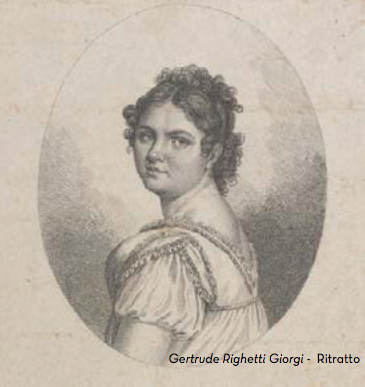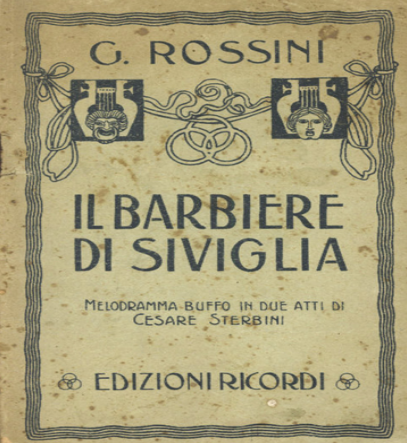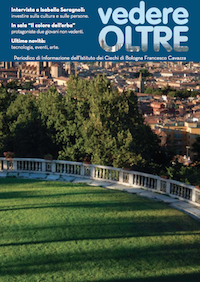The history of Italian opera in the nineteenth century is not made only by the great composers and famous virtuosi who have contributed to the dissemination of the genre worldwide. It is also made by the thousands of renowned artists of the time, applauded on stage and protagonists of memorable premieres that have often been forgotten today. In this year 2016 in which we celebrate together the birthday of Rossini (born February 29th, and therefore celebrated only in leap years) and the bicentennial of his Barber of Seville, we are pleased to remember the Bolognese contralto Gertrude Righetti Giorgi. Her exceptional talent is linked to the success of the Barber's premieres and the subsequent Rossini's Cinderella.
Celebrated during her very brief career, Giorgi has been well forgotten, mistaken by a few biographers for her famous compatriot Maria Brizzi Giorgi, not only because of the similarity of the name, but also because they have both been honoured and appreciated as musicians by Rossini and (as it happens in life). They had the same husband, lawyer Luigi Giorgi. When Maria died, he married Gertrude.

But first things first.
Gertrude was born in Bologna in December 1789. Very young, she showed a predisposition to the art of singing and performed in salons and active music circles in the city in the early nineteenth century, where she met the young Rossini, a guest equally appreciated in those places.
In 1811, still a student, she interprets in Bologna an opera by Cimarosa first at the Felicini theatre and then at the Marsigli-Rossi theatre and another by Pilotti at the Corso theatre. After a proper debut, which took place in 1813 in Bagnacavallo with a work of Pavesi, the young lady seemed to have begun a brilliant career. But instead she quit the stage and married old Luigi Giorgi, very popular Jacobin, dramatic author and journalist.
The pause only lasted a short time as the Napoleonic dream was gone as well as the fortunes of her husband. Gertrude was compelled to return to the stage to ensure the survival of the family. Joining the Argentine Theatre in Rome, she became the protagonist in the new opera by Rossini (The Barber of Seville) who gave his approval, reminiscent of their old friendship, and assented to her presence.
"I had just turned 23 years of age, she wrote, my voice was well appreciated in Rome as one of the finest to be ever heard. I was so eager to do my duty that I had almost become a daughter of the Romans. And Rossini admired me very much." However, this did nothing to avoid the fiasco of the performance which took place on February 20, 1816. Rossini remembers: "Then came the time for Rosina. The singer was willing to do anything. Eagerly, she climbed the stairs that was to lead her to the balcony: but Romans had expected her to sing a pleasant and loving piece. When they realized that it was not to be so, the audience broke into whistles and catcalls."
History tells us that it was not the interpreters' fault, and that the second performance was a triumph. Thanks to this success, the singer was invited to Rome the following year, at the Valle, as Cinderella's protagonist. So, she began singing again in Italy and, in the summer of that year, she brought for the first time in Bologna (Contavalli theatre) Rossini's diptych The Italian Girl in Algiers and The Barber of Seville.
Extraordinary for her vocal range and fullness of tone, Gertrude resumed her career in Italy, from Rome to Venice, from Piedmont to Liguria and Tuscany. Then, suddenly, in 1819 unexplained health crises prevented her regular activities and from then she alternated between appreciation and triumphs to resounding fiascos until, in 1822, she decided to definitely retire from the stage while continuing to follow theatrical events.
And in that year, in response to allegations published by journalists about Rossini in Europe, she wrote her famous memoir entitled Cenni di una donna già cantante sopra il maestro Rossini in risposta a ciò che ne scrisse nella state dell'anno 1822 il giornalista inglese in Parigi (A reply to an article entitled “Rossini” by an English journalist in Paris), a valuable source of documentation.

Those are Gertrude's last words: from that moment, she disappeared from the history of the theatre and the city's life, absent from the musical evenings of the academies and private circles.
Gertrude Righetti Giorgi died January 24, 1862: the world, history and society had by then changed. Only a few obituary lines were written about her in the newspapers.





.png)